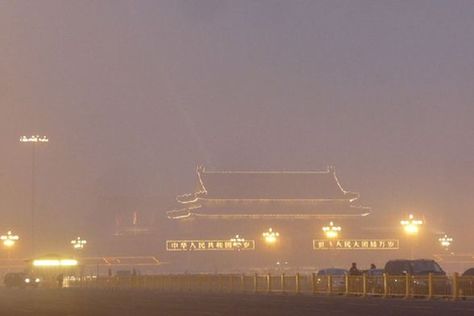Beijing toughens pollution rules for cleaner air
 0 Comment(s)
0 Comment(s) Print
Print E-mail Xinhua, September 2, 2013
E-mail Xinhua, September 2, 2013
Beijing on Monday unveiled a package of measures, including cutting vehicle emissions and curbing industrial pollution, in a bid to improve air quality in the often smog-shrouded city.
 |
|
Dense smog shrouds Beijing. [File photo] |
The package is part of an action plan released by the municipal government, which has pledged to reduce PM 2.5 density by 25 percent or more by 2017.
According to the five-year clean air action plan (2013-2017), the municipal government will restrict the number of new cars on the road each year from January 2014.
By 2017, the number of vehicles in the city is expected to be no more than 6 million, according to the package. The city had 5.35 million vehicles by the end of July, according to figures from the Beijing Traffic Management Bureau.
By promoting new-energy and small-displacement vehicles, reducing the intensity of vehicle use and strictly enforcing regulations, the government expects to reduce total vehicle fuel consumption by 5 percent or more compared with 2012.
The city's traffic management and environmental protection bureaus will prepare traffic control rules for passenger cars by the end of 2013, which will mainly focus on time and area restrictions. The rules are expected to be implemented in 2014.
The municipal government has also vowed to improve the city's public transport and introduce a comprehensive public bicycle rental system by 2017, in order to make public transportation account for 60 percent of total vehicle trips made in the city.
Under the plan, air quality will improve significantly by 2017, with PM 2.5 density controlled to around 60 micrograms per cubic meter.
PM 2.5 are airborne particles measuring less than 2.5 microns in diameter which can pose health risks.
Vehicles in the city are considered a major contributor to Beijing's pollution -- and one that keeps growing.
A report issued by a research team under the Chinese Academy of Sciences revealed that vehicle exhaust fumes are among Beijing's top sources of air pollution, contributing to 22.2 percent of PM2.5 in the city, exceeding the figure for industry emissions.
"In order to curb vehicle emissions, we have to introduce a market mechanism to reduce intensity of vehicle use," said Li Kunsheng, an official in charge of vehicle emission management with the Beijing Municipal Environmental Protection Bureau.
Li said that government departments should make changes to parking costs and raise fuel prices, with the extra money used to deal with emission reduction.
"But both means should be carried out carefully as they may affect people's livelihoods," Li added.






Go to Forum >>0 Comment(s)